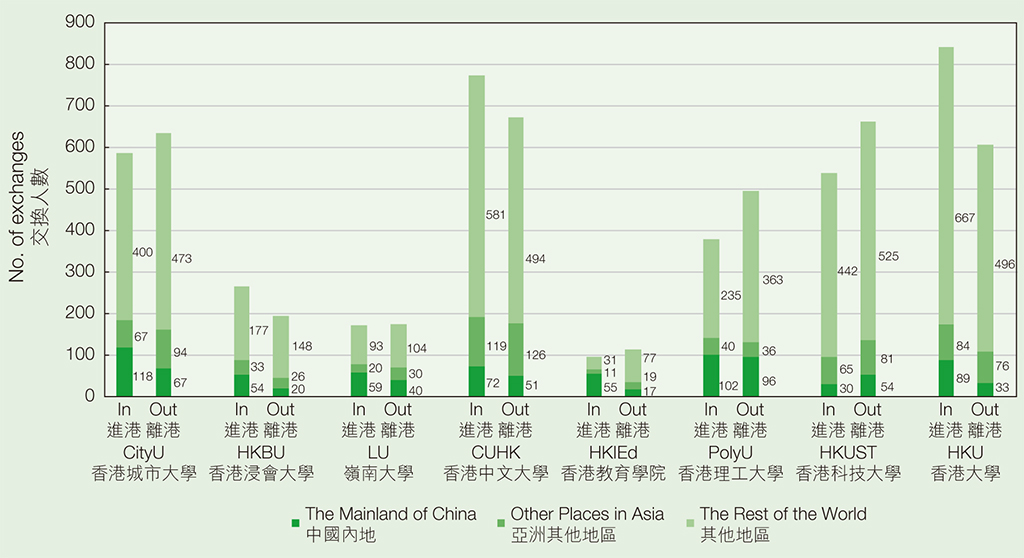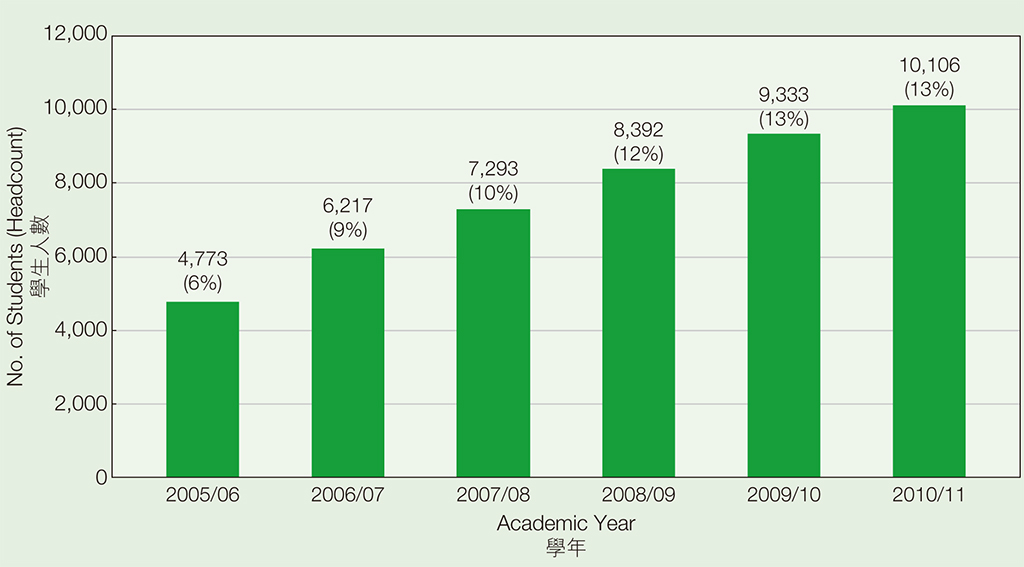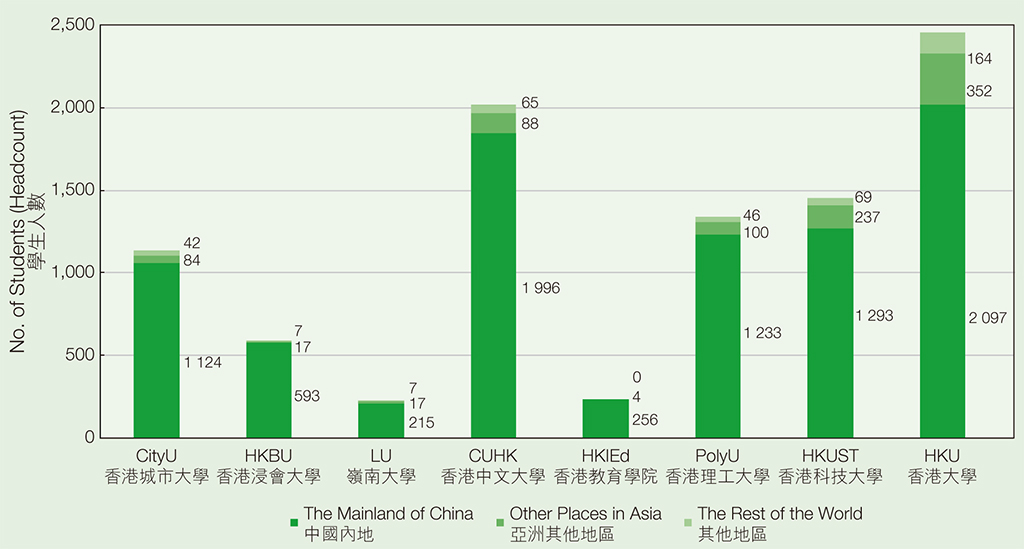|
The three key themes of the report are:
Need for Improved System-level Structure
The sector’s expansion over a period of time has resulted in a complex and fragmented post-secondary
education system, which is difficult for current and prospective students to navigate. The UGC is convinced that all
elements of post-secondary educational provision should be treated as a single interlocking system with better
transparency, coherence and mobility.
The improved structure should provide clearer progression
pathways for students to articulate between different levels and across different parts of the system. This should be
facilitated by a comprehensive Credit Accumulation and Transfer System, and a single quality assurance body to
ensure better coherence in the quality of the system. The report also recommended the establishment of a new
body to provide advice to the Education Bureau on the needs and development of the non-publicly funded part of
the post-secondary education sector.
The Role of the UGC Sector
UGC-funded institutions are the direct beneficiaries of
significant amounts of public funds. We therefore believe the UGC sector has unique roles to play. The report
emphasised the need to press ahead with ensuring the UGC-funded institutions have excellent teaching,
research and community engagement. This is being pursued through the recently started reforms within the
UGC sector, e.g. the goal to encourage institutions to put greater attention to teaching and a focus on outputs
and outcomes (rather than inputs) and a move to a more competitive research funding regime.
The UGC also took the opportunity to review its fitness for purpose. During our consultations, the view was
expressed that the UGC played a useful role as an intermediary between its funded institutions and the
Government, but stakeholders also wished that the UGC would focus more on macro and strategic issues. In
fact, the UGC has been moving in this direction recently (including the review and streamlining of the Notes on
Procedures), and will continue to do so.
Internationalisation and Collaboration with Mainland
China
The report emphasises
the importance of internationalisation in the higher education sector, with a
view to helping Hong Kong retain its uniqueness as an international city, and at the same time maintaining a close
relationship with the Mainland system. We believe this is one of the features which gives Hong Kong its niche to
remain competitive in a highly globalised world. It is also what distinguishes Hong Kong from other Chinese cities.
More details on this important initiative can be found in the following section.
We are pleased that the report has stimulated interest
in and discussion on the purposes of higher education and appropriate strategies for the future development of
Hong Kong’s higher education system. The Government is studying the recommendations in the report and
consulting the public and stakeholders in the postsecondary education sector before coming to a view on
implementation. We look forward to the Government’s positive response to the report ’s directions and
recommendations.
Internationalisation
Internationalisation is one of the three key themes of
the report “Aspirations for the Higher Education System in Hong Kong”. We see it as the key to Hong Kong’s future, and that it should be actively pursued by
UGC-funded
institutions. Internationalisation does not mean neglecting our traditional values and local needs. These
are not mutually exclusive. Internationalisation means much more than the recruitment of non-local students,
and should permeate the whole gamut of institutional activity, including the internationalisation of the faculty
broadening the curriculum, providing local students with more opportunities in overseas exchange programmes,
the integration between local and non-local students and other means.
The UGC-funded institutions can and are already using
part of the funding raised from the Matching Grant Schemes for supporting student exchanges. They continued with numerous student exchange activities
in 2010, and have established academic links with institutions from all round the world. Given the importance
of enhancing the international exposure of local students and boarding their horizons as recommended in the
“Aspirations” Report, the UGC decided to provide a further one-off $50
million to the eight-funded institutions on a matching basis primarily for enhancing the exchange opportunities for local students. Institutions can use the
funds for up to three years' time. We hope institutions will make good use of the matching grants to open up
more
overseas exchange opportunities for local students and enhance students’ international outlook, so that
they will
be well equipped to face the challenges in the globalised economy.

Chart 1: Incoming and Outgoing Exchange Students by Institution and Source/Destination in
2009/10

In terms of non-local student recruitment, starting from 2008/09, the UGC-funded institutions are allowed to
increase, in phases, the non-local student quota for publicly-funded programmes at the sub-degree, degree
and taught postgraduate levels from 10% to 20% of the approved student number targets. The percentage of
nonlocal students in institutions has been on the rise:
Chart 2: Non-local Student Enrolment (Headcount) of UGC-funded Programmes, 2005/06 to
2010/11

Note: Figures in brackets denote percentages of non-local students to total student enrolment.
In 2010/11, the eight institutions recruited 1856
first-year-first-degree (FYFD) non-local students from the
Mainland and other places, accounting for about 13% of the planned intake.
Chart 3: Non-local Student Enrolment (Headcount) of UGC-funded Programmes by
Institution
and Place of Origin, 2010/11

As mentioned, the successful implementation of internationalisation requires more than the recruitment of
non-local students. The UGC is glad that the Education Bureau has been working hand in hand with institutions
to step up exchange and promotion of education services in Hong Kong. Three delegations were organised by
the
Education Bureau in 2010 to visit Malaysia and Indonesia, Korea and Japan as well as India, and joined by
a number
of the UGC-funded institutions. These were important steps to enhancing the international visibility of
our
education services.
The UGC will continue to work closely with the Government and UGC-funded institutions to attract more
quality non-local students and deepen internationalisation. Indeed the RGC continued to implement the Hong Kong
PhD Fellowship Scheme in the year with the aim of attracting the best and brightest students from around
the world to undertake RPg education in Hong Kong. More details can be found in the chapter
“Research & Knowledge Transfer”.
|



